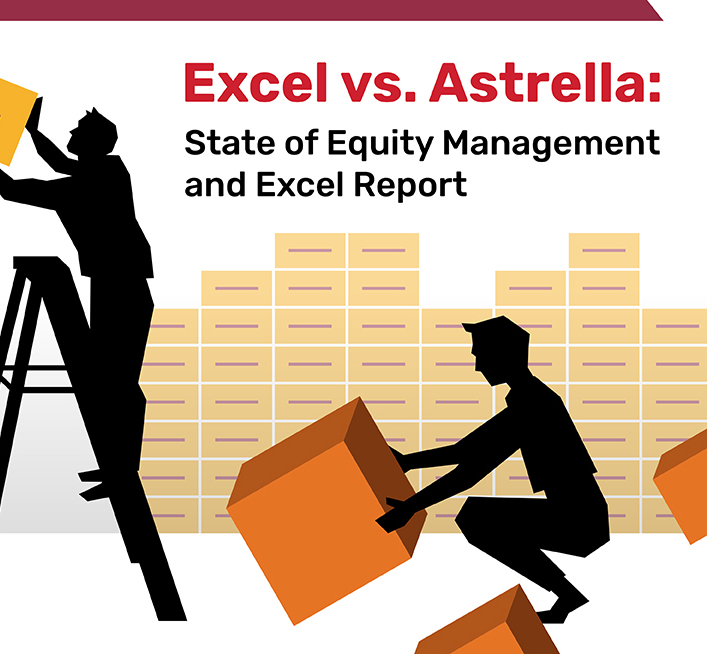A 409A valuation is an important process private companies use to make sure that their equity compensation events are fair and compliant with IRS regulations. It involves determining a company’s common stock’s fair market value (FMV), which can be used in various aspects of a business’s financial planning. This article will provide an overview of what 409A valuations involve, why they are necessary, and the role a cap table plays in the process. We’ll also look at the components of a 409A valuation to understand how this crucial process works.
Talk with an Equity Management Expert Today
What is a 409A valuation?
A 409A valuation is a process that determines the fair market value of a private company’s common stock to comply with IRS regulations and ensure that equity compensation events are fair. This involves analyzing the company’s financials, plans and potential, and industry trends. The results of the valuation are then used to determine the price of common stock in the event of a fundraising round, sale, or option grants.
The valuation can also help protect companies from legal issues by providing evidence that their compensation practices were conducted in accordance with IRS regulations. It’s important to note that 409A valuations are not required for all private companies but are recommended for those seeking venture financing or issuing stock options.
To conduct a successful 409A valuation, companies should have an accurate and up-to-date cap table. A cap table records who holds equity in a company, including founders, investors, and employees who have been granted stock options or other forms of compensation. Cap tables help provide insight into who owns what percentage of the company, which is necessary for assessing fair market value during a 409A valuation.
Understanding and analyzing the data included in these tables can be very helpful in determining whether any changes need to be made before issuing new equity grants or conducting other types of transactions involving common stock. This data is invaluable because it can help inform decisions about how much money should be allocated for each shareholder’s ownership stake. Plus, it allows companies to plan accordingly for taxes and other financial obligations associated with equity compensation events.
Overall, 409A valuations are important in ensuring fair market value for private companies’ common stock offerings and helping them comply with IRS regulations. Companies considering venture financing or issuing stock options should consult an experienced professional before initiating this process so they can get reliable advice on how best to proceed with their valuation needs.
Purpose of 409A valuations
A 409A valuation is essential for companies engaging in equity compensation events or organizational change. This process will help ensure that all stakeholders receive fair compensation and that the company complies with IRS regulations. By assessing the current financials, plans, industry trends, and cap table before initiating the valuation process, companies can make sure they get an accurate assessment of their company’s true fair market value which, will inform decisions about how much money should be allocated for each shareholder’s ownership stake.
Regular valuations can also help inform decisions around share buybacks or dividend distributions to help avoid negative tax implications for shareholders. Additionally, it can be used as a basis for setting the exercise price of options granted to employees and other stakeholders. Experienced professionals should be consulted before this process begins to ensure compliance with IRS regulations and fairness among all parties involved.
Essentially, 409A valuations are necessary for private companies to stay compliant with IRS regulations and create a culture of fairness when dealing with equity compensation, such as granting options or issuing restricted stock units (RSUs). By consulting your cap table before initiating this process, you can ensure all stakeholders have an accurate assessment of your company’s worth.
Components of a 409A valuation
A 409A valuation is an important tool for determining the fair market value of a private company’s common stock. To complete this process, three major components must be considered: the discount rate, the company’s risk profile, and the valuation multiplier.
- The Discount Rate is based on an analysis of the company’s risk profile. It accounts for any risks associated with investing in a particular company or industry, such as economic cyclicality or competitive rivalry. The higher the risk associated with a company’s stock, the higher its discount rate.
- Risk Assessment: Valuation professionals assess the risks associated with the company and its industry. Factors like market competition, technological advancements, regulatory environment, and management expertise are considered. This risk assessment is crucial in determining the appropriate discount rate to apply to the company’s projected cash flows or earnings.
- The Valuation Multiplier is determined by looking at factors such as a company’s historical performance, current performance, market conditions, and other factors that can influence its future earnings potential. This multiple helps determine how much equity should be reserved for employees and other stakeholders when issuing new shares or granting options.
These three components are used to figure out a 409A valuation. This tells you how much ownership should be set aside for employees and others when giving out new shares or options. Before starting this process, it’s essential to seek expert advice to ensure it’s fair and follows IRS rules.
Why companies need to do a 409A valuation
The valuation process involves an independent appraiser, who will assess the fair market value of equity compensation events such as issuing new shares or granting options. This ensures that all shareholders have an agreed-upon price per share and prevents future disagreements over different values of common stock.
Furthermore, conducting a 409A valuation can help protect companies from potential tax liabilities and legal issues in the event of an audit by the government or other agencies. It provides evidence that the company has considered fair market value when making decisions about shareholder ownership stakes and holds all parties accountable to IRS regulations. It creates a legally binding agreement between shareholders to ensure fairness throughout any equity compensation events or changes in organizational structure.
A 409A valuation is crucial for companies that want to offer equity compensation or make organizational changes. It safeguards them from tax problems and legal disputes while ensuring fairness in determining each shareholder’s ownership value.
What Is the role of a cap table in 409A valuation?
Your cap table is an essential element of a 409A valuation. It outlines your firm’s ownership and equity structure, displaying who owns what percentage of the company. This information helps you figure out how much money should be allocated for each shareholder’s stake in the organization. Additionally, its data can provide insight into stock splits or option grants and guide decisions around buybacks or dividends.
Beyond 409A valuations, cap tables are also used in various other scenarios like calculating taxes on employee stock options or managing dilution of shares. They also clarify voting rights, prevent legal conflicts between shareholders related to ownership stakes, and track equity distributions.
Cap tables are invaluable for assessing fair market value and complying with IRS regulations while maintaining fairness throughout organizational changes or stock compensation events. Companies should seek professional guidance before beginning any valuation process to ensure that all parties involved are treated equitably according to established standards.
Always be ready to conduct your 409A valuation
The complexities of a 409A valuation are best navigated with the help of an experienced financial advisor. These individuals can provide critical assistance in helping you assess your equity, ensure you remain compliant with IRS regulations, and maintain fairness among all parties involved. The evaluation results will provide a comprehensive understanding of fair market value, allowing you to decide how much money should be allocated for each shareholder’s ownership stake.
Conducting a 409A valuation is critical for any company considering raising capital or issuing equity. By thoroughly comprehending what it entails, businesses can safeguard themselves from potential tax liabilities and legal issues in the event of an audit. Financial advisors play an integral role in this process by assisting companies in accurately assessing their equity and remaining compliant with IRS regulations while ensuring fairness among all shareholders.
Contact an Expert to Talk About Your Employee Equity Plans
- Adam Jaqueshttps://astrella.com/blogs/author/thoughtsource/
- Adam Jaqueshttps://astrella.com/blogs/author/thoughtsource/
- Adam Jaqueshttps://astrella.com/blogs/author/thoughtsource/
- Adam Jaqueshttps://astrella.com/blogs/author/thoughtsource/






























































































































